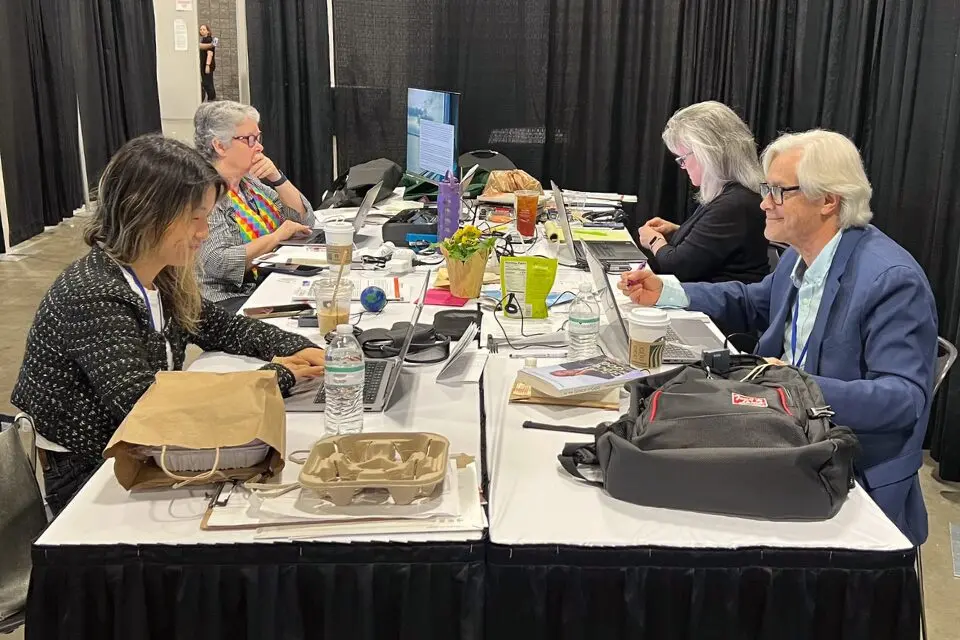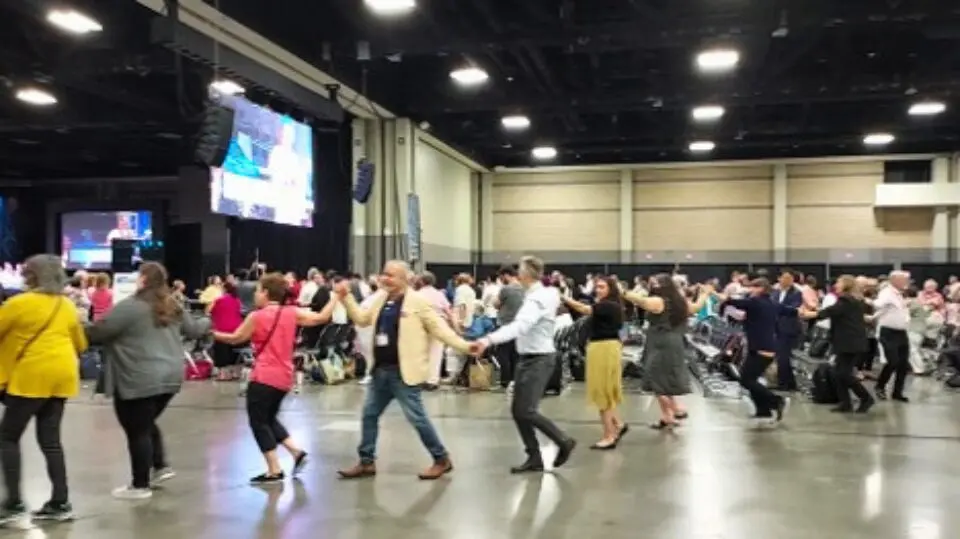As a monitor for the General Commission on Religion and Race at General Conference, Rev. Jerry DeVine examines the historic event and wonders how the UMC will live into connectionalism without placing the U.S. church and dominant white culture at the center.
REV. JERRY DEVINE
Elder, Michigan Conference
“The people who walked in darkness have seen a great light; those who lived in a land of deep darkness — on them light has shined” (Isaiah 9:2, NRSV).
This poetic sentence from the book of Isaiah dates to around 732 BCE. Though we do not know the specific historical circumstances that created the image of people walking in darkness, we can share in the energy of the promise that Yahweh, the great I am, will bring new light to shine upon those who have struggled.
Many United Methodists will be most familiar with this prophetic text during Advent, a time of expectant hope. It is reflected in Zechariah’s song in the Gospel of Luke: “By the tender mercy of our God, the dawn from on high will break upon us, to give light to those who sit in darkness and in the shadow of death, to guide our feet into the way of peace” (Luke 1:78-79).
For me and many participants I interacted with at the delayed 2020 General Conference, it truly felt like a new dawn was unfolding for our beloved and somewhat beleaguered United Methodist Church. I captured the above photo of the dawn breaking on the first day of General Conference. It embodied the yearning I felt as I prepared to walk from my hotel to the Charlotte Convention Center.
This was my seventh time monitoring a General Conference around issues of racial justice, institutional equity, and racial inclusion. My role for the past five General Conferences, including this one, was as a member of the official writing team for the General Commission on Religion and Race (GCORR). Along with my co-writer, Dr. Ella Curry, we interacted with 14 official volunteer monitors and staff that GCORR had on-site to fulfill their mandate. The General Commission on the Status and Role of Women (GCSRW) had a similar team focused on issues of gender equity and inclusion. Collaboratively, our work sought to be a form of reflective conscience to the gathered body as we looked at both the process of decision-making and the impact of those decisions.
Some of the GCORR equity questions we raised were:
-
- Who will benefit from this legislation, and in what ways?
- Who will gain or lose power (authority, access)?
- Who will gain or lose resources (budgets, staff, ministries, buildings)?
Equity is about creating access, especially for those often pushed to the margins. The prophet Isaiah understood that God’s will for justice, righteousness, and peace must become tangible in real historical contexts. Actions of this General Conference changed systems, policies, and practices that had excluded an entire group of people since 1972. Light shone on those who had been forced to walk in darkness.

It is hard to describe the seismic shift in the qualitative mood of this General Conference in comparison with several of the previous gatherings. From day one, there was an aura of cautious hope and openness. Due to my roles at these gatherings, I have directly observed the negative nature of clandestine activities outside the official plenary work, or they have been reported to me. It made me mindful of Jesus’ admonition: “Nothing is covered up that will not be uncovered, and nothing secret that will not become known. Therefore whatever you have said in the dark will be heard in the light, and what you have whispered behind closed doors will be proclaimed from the housetops” (Luke 12:2-3).
I am grateful I observed no negative activity at this General Conference. When people differed in their perspectives, they did so openly and without malice. Delegates seemed to genuinely seek the wholeness and vitality of a newly transforming United Methodist Church.
The Book of Discipline reminds us in ¶ 125 of how we relate to one another within The United Methodist Church: “United Methodists throughout the world are bound together in a connectional covenant in which we support and hold each other accountable for faithful discipleship and mission. Integrally holding connectional unity and local freedom, we seek to proclaim and embody the gospel in ways responsible to our specific cultural and social context while maintaining ‘a vital web of interactive relationships’ (¶ 132).”
However, one of the central challenges leaders of this denomination face is how to move into that vital web without the U.S. church and dominant white culture at the center. The legislation that approved worldwide regionalization is critical to a renewed and transformed UMC.

My secondary role at General Conference was as a voting member of the Connectional Table (CT). The CT is “where ministry and money are brought to the same table to coordinate the mission, ministries, and resources of The United Methodist Church” (The Book of Discipline, ¶ 901). The CT’s purpose is “for the discernment and articulation of the vision for the church and the stewardship of the mission, ministries, and resources” (¶ 904). As a member of the CT, I was chair of the writing team that drafted the original regionalization legislation that would have created the U.S. Regional Conference. Thankfully, that seed was vastly expanded and enriched when it was taken over by members of Central Conferences, resulting in the final legislation the Standing Committee on Central Conference Matters presented to General Conference.
Editors David W. Scott and Filipe Maia write in their introduction to the book Methodism and American Empire: Reflections on Decolonizing the Church: “In Wesleyan ecclesiology, connectionalism marks the commitment to a vision of the church that imagines itself as a network of communities gathered by the Spirit of God. The connectionalism of empire operates in the logic of annexation and homogenization. Its connectionalism is a vast network for the imposition of a singular perspective and of an exclusive and exclusionary mode of assembling.”
For me and those from Central Conferences I have been blessed to work with, the overwhelming vote to approve worldwide regionalization was every bit as monumental as the removal of harmful language relating to siblings in the LGBTQIA community. “By the tender mercy of our God, the dawn from on high” has truly broken upon us. Thanks be to God!
Rev. Dr. Jerome DeVine is a retired United Methodist elder in the Michigan Conference. He currently serves part-time as the executive director of the Native American Course of Study Extension School, whose goal is to educate and train Native American local pastors in The United Methodist Church. His final project to complete his Doctor of Ministry from Wesley Theological Seminary was “Race, Ethnicity, and Ministry in the Wesleyan Tradition.”
Last Updated on May 16, 2024

